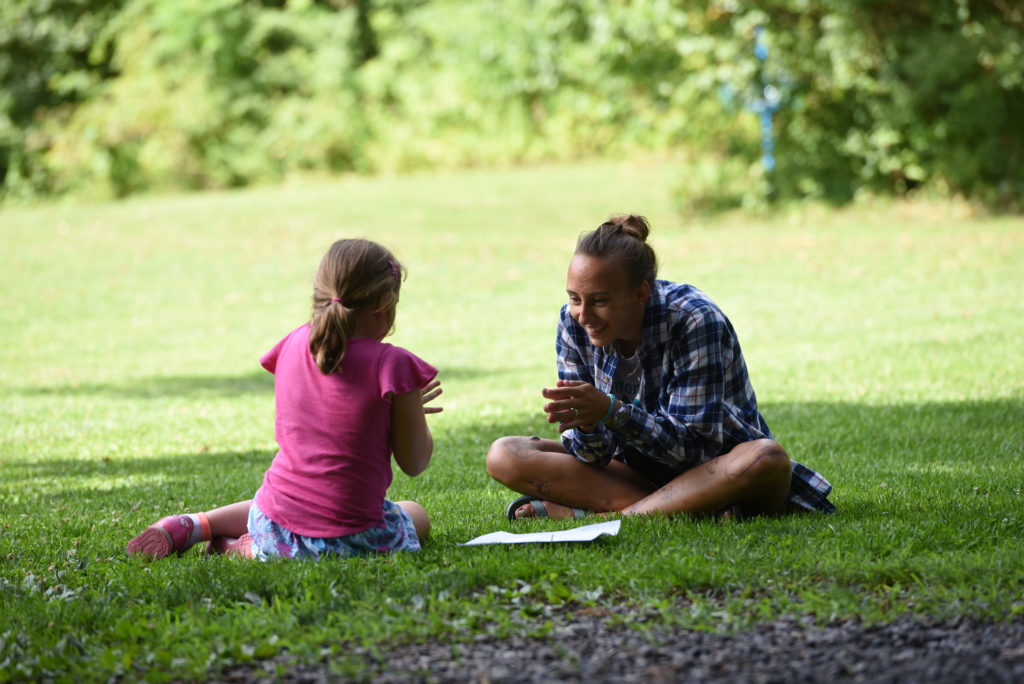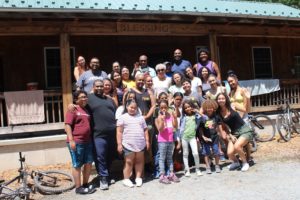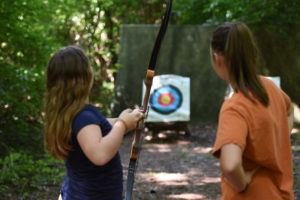
Hope Martin (right) with camper at Woodcrest Retreat. Photo by Eliza Taylor.
By Camille Dager, Mennonite Church USA
Thirteen leaders from the Mennonite Camping Association (MCA) recently met via videoconference to discuss their experiences during what Christianity Today magazine described as “Christian camps’ weirdest hardest summer.” Meeting participants represented camps in Colorado, Illinois, Kansas, Michigan, Mississippi, New York, Pennsylvania and Canada.
“All of the camps have been impacted by COVID-19, but they experienced it in different ways,” said Olivia Bartel, MCA Member Relations Coordinator and director at Camp Mennoscah, Murdock, Kansas, explaining that MCA has 37 Anabaptist camps in the United States and Canada. Approximately three quarters of those camps have strong ties to Mennonite Church USA congregations.
Many camps had no youth camp this summer, others had a limited season and a couple had a full season. For most, the pandemic has resulted in significant financial decreases, according to Bartel.
Some camps, such as Rocky Mountain Mennonite Camp, were limited by state restrictions for all or part of the summer. Other obstacles, such as lack of Internet and remote camp locations, further limited options. Forest fires were a threat to several camps, including Camp Keola in Lake Shore, California, and Drift Creek Camp in Lincoln City, Oregon. Both camps survived the fires due to efforts of local firefighters, but the way forward is not yet clear.
“Our next decision is whether to plan on opening in 2021,” said Duane Ruth-Heffelbower, executive director, Pacific Southwest Mennonite Retreat Ministries, which owns Camp Keola. “We stayed closed this year, and the decision about next year won’t be obvious.”
Camp directors are addressing financial shortfalls through the generosity of donors, creative restructuring, meal/food fundraisers (One camp sold cinnamon buns!) and through the Paycheck Protection Program (PPP), a loan program established by the U.S. federal government to help nonprofits and certain other businesses to continue to pay their workers.
Even when camps are closed, maintenance is a constant concern and expense, Bartel explains, as buildings, grounds and equipment require ongoing care.
Despite the cloudy financial outlook for 2020, the camp directors at the MCA gathering shared a spirit of resiliency.

Moises Angustia, associate pastor of United Revival Mennonite Church in Brooklyn, and his family appreciated the opportunity for a family-sized retreat at Camp Deer Park in Westbrookville, New York, this summer: “Thanks for hosting the family. You were very mindful of the social distancing aspect of life now. Great new memories,” he said.
“Our MCA camps are trying to be hopeful and are continuing to restructure activities to serve their communities,” said Bartel. During the summer, some camps provided creative alternatives, such as camp-in-a-bag. Others pivoted from large church group rentals to providing space for renewal and refreshment for smaller family groups.
Woodcrest Retreat, a day camp and retreat center in Ephrata, Pennsylvania, was a rare exception among the MCA camps. The camp welcomed 1,400 campers during its eight-week 2020 season – just a few dozen shy from its record-breaking 2019 season of 1,500 campers.
Opening during a pandemic was not without its challenges, Bill Klees, executive director, explained. It required adaptations that included additional staffing, prepackaged meals, creating small pods of campers for activities and new sanitizing routines.

Woodcrest Retreat, Ephrata, Pennsylvania. Photo by Eliza Taylor.
“We know that Christian camping offers a place for children to be children; where they can develop their imagination and grow spiritually,” said Klees. “Our message of Christ’s love is being used by God to change lives, to bring smiles to young people’s faces, to instill peace and to transform lives.”
The opportunity to transform lives is confirmed in the feedback that camp directors hear every year. Klees shared an anonymous survey response from a parent whose child attended camp at Woodcrest Retreat this summer:
“Our daughter was so depressed since school closed. Camp has made her come alive. She is able to recite scripture and loves God. You are truly making a huge impact on their lives!”
It’s also worth noting that attending Christian camp appears to have a lasting effect. In 2016, researchers Jacob Sorenson, Ph.D., and Paul Hill, D. Min., conducted The Effective Camp Research Project, a survey of 1,000 campers attending residential camps affiliated with the Evangelical Lutheran Church in America. Their survey showed that campers increased their “horizontal faith,” or faith that is relevant in daily life (e.g. “Faith in God helps me in my daily life” and “It is important for me to belong to my church or congregation”), and retained this growth long-term.
“Pastors frequently hear from youth baptismal candidates that a camp experience was key to their decision to follow Jesus,” said Shana Peachey Boshart, MC USA denominational minister for Faith Formation. “Many young people experience their first call to ministry in a leadership role as camp staff. Sometimes we overlook the importance of camps in faith formation and leadership development, but there is clear evidence that they are extremely important.”
“We are constantly aware that camp is an important faith formation vehicle,” said Bartel. “When camps are closed, campers are missing that opportunity to discover and grow in their faith. As for MCA, we are still here, working to find ways to connect with our campers and communities.”
There seems to be no shortage of innovative ideas from the various camps. Several are offering outdoor education classes. Others are providing space for homeschoolers and local school students who are working virtually. Some are featuring small group activities, such as handbell lessons at Camp Men-O-Lan in Quakertown, Pennsylvania, and scrapbook retreats at Beaver Camp in Lowville, New York. A few are reaching out virtually. Menno Haven Camp & Retreat Center even welcomed followers to a virtual campfire on Facebook, reminiscent of The Yule Log classic television program.
When asked how people can help camps get through the uncertain months ahead, Bartel said:
“If you’re able to come out and support your local camp, please do. Please pray for our camps, visit them and drop them a note of encouragement.”
Donations may be given directly to MCA camps. For a list of member camps, visit http://www.mennonitecamping.org/.
Established in 1960, the Mennonite Camping Association is committed to being a connecting place for camping ministries from across the Mennonite/Anabaptist faith tradition.
Mennonite Church USA is the largest Mennonite denomination in the United States with 16 conferences, approximately 530 congregations and 62,000 members. An Anabaptist Christian denomination, MC USA is part of Mennonite World Conference, a global faith family that includes churches in 86 countries. It has offices in Elkhart, Indiana and Newton, Kansas. mennoniteUSA.org
Read the blog by Rodger Schmell, “Reconnecting with God at camp.”
Find a list of Mennonite Camp Association camps to visit and support at mennonitecamping.org.

